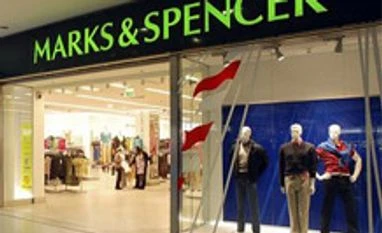British retailer Marks & Spencer posted its lowest annual profit since 2009 on Tuesday as a struggling clothing and homewares division dragged on growth in food sales.
The 129-year-old firm, which serves 21 million shoppers a week from over 700 UK stores, said it made a profit before tax and one-off items of 665.2 million pounds in the year to March 30, a second straight fall.
The outcome compares with analyst forecasts of 640-670 million pounds, with a consensus of 658 million pounds, according to a poll published on the company's website, and is a decline on the 687.2 million pounds made in 2011-12.
Group sales rose 1.3% to 10.0 billion pounds.
M&S, whose shares have risen 30% over the past year after periodic bouts of bid speculation, kept its annual dividend at 17 pence a share.
The group forecast "underlying profit improvement" in the 2013-14 year but cautioned it expected to incur about 30 million pounds of non-recurring dual-running costs, as a result of the transition to a new web platform and the opening of a new distribution centre in Castle Donington, central England.
Many UK retailers are finding the going tough as consumers, whose spending generates about two-thirds of UK gross domestic product, fret over job security and a squeeze on incomes.
M&S's profit fall, which reflected seven consecutive quarters of underlying sales declines in general merchandise, will likely impact the performance-related annual bonus of Chief Executive Marc Bolland.
Shares in M&S hit a five-year high last week after its clothing strategy update and eagerly awaited autumn/winter ranges were well received by analysts and the fashion press.
Bolland, CEO since May 2010, is under pressure from investors to revive M&S's clothing, which has been losing market share to firms like Primark and Debenhams .
The autumn/winter ranges are widely seen as make-or-break for a new general merchandise team, assembled by Bolland and led by John Dixon, the former boss of M&S's food business, and Belinda Earl, the former CEO of Debenhams and Jaeger.
Bolland has repeatedly said the new team will not make a major impact on sales until the ranges start hitting the shops in late July.
M&S said trading over the first seven weeks of the new financial year had been in line with its expectations.
For 2013-14, it forecast gross margin growth of 30-50 basis points and a 3.5% rise in operating costs.
Group capital expenditure (capex) was forecast at 775 million pounds, a reduction on previous guidance of 850 million.
From 2014-15 M&S expects capex to fall to about 550 million pounds versus previous guidance of 600 million.
Shares in M&S closed on Monday at 451 pence, valuing the business at 7.28 billion pounds.
)